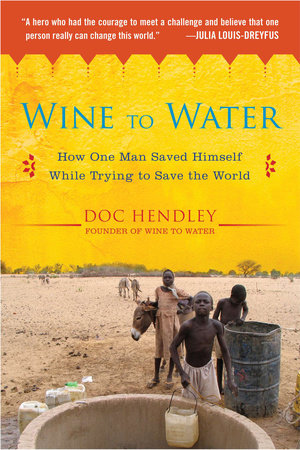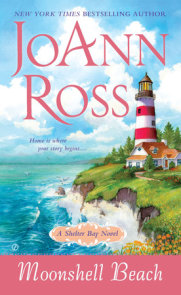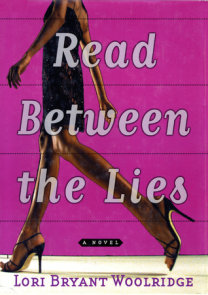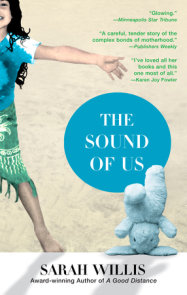READERS GUIDE
Questions and Topics for Discussion
INTRODUCTION
“What is the definition of life?
Is it eating, sleeping, breathing?
Or is it something much greater?” (p. 199)
In 2003, Dickson “Doc” Hendley was like most American college students and just having fun. Yet, he remembers “a sinking feeling in my stomach, like I should be doing something better with my life” (p. 27). Within months, the college senior and popular bartender launched an organization that has already improved—and saved—thousands of lives in more than nine countries around the globe.
Despite being the son of a preacher, Doc doesn’t fit the Good Samaritan stereotype. Self-described as “rough around the edges” and tattooed, Doc took an early dislike to rules and developed a taste for whiskey and Harleys while still a teen. As his college graduation neared, Doc began to dread the prospect of life “in a cubicle” (p. 27).
By chance, Doc learned about an international aid organization named Samaritan’s Purse and began brainstorming ways that he could help the world’s needy. That night he woke up from his sleep with the words “wine to water” spinning around in his head.
Doc hit the Internet and learned that “unclean water kills a child every twenty seconds—it’s more lethal than AIDS, malaria, and tuberculosis combined” (p. 30). He immediately began drawing on his connections to host a party benefiting clean water initiatives. Within a month, he’d raised twelve thousand dollars.
Suddenly, Doc had to decide where it should go. “I never wanted Wine to Water to be like one of those bullshit nonprofits . that used the majority of the donations to pay staff” (p. 37). After talking to a Samaritan’s Purse director, he unexpectedly walked out with a twelve-month job assignment in Darfur—and the authority to distribute the money where he felt it was needed most.
Nothing could prepare Doc for what awaited him. He had flown from verdant North Carolina into a barren desert landscape where average daytime temperatures hit 120-degrees and government-sponsored Janjaweed soldiers had already killed a hundred thousand civilians and displaced more than a million more.
While Doc had fantasized about “instantly morphing into some superhero water savior” (p. 55), the reality was infinitely more complex. But as inexperienced as he was in some ways, Doc knew a lot about human nature: “It’s not so much about how good and fast you are at making a Fuzzy Navel; it’s about developing a good relationship with the people sitting in front of you at the bar” (p. 111).
So whether he was hiring staff, placating soldiers, or declining proffered brides, Doc tactfully negotiated an unfamiliar culture to do his real work. Slowly, Doc began repairing wells, installing water bladders, and teaching the locals how to maintain them—sometimes while the bullets were being aimed at him.
In plainspoken and impassioned prose, Wine to Water shares the story of Doc’s unlikely transformation from a rough-and-tumble bartender to CNN Hero. As informative as it is harrowing and inspiring, Doc’s account of our global water crisis and his continuing quest to provide stricken peoples with clean water resoundingly proves that one man is capable of changing the world.
ABOUT DOC HENDLEY
Doc Hendley is the Founder and President of Wine to Water, a non-profit organization focused on providing clean water to people in need around the world. In 2009, Hendley was named a CNN Hero. When he isn’t traveling to underdeveloped nations or raising awareness for the world’s water crisis, Hendley spends his time in Boone, North Carolina with his wife and two children. For more information, visit www.winetowater.org.
A CONVERSATION WITH DOC HENDLEY
Most people don’t think twice about “living selfishly and always for the moment, without anyone else in mind” (p. 27). How did you come to have such a strong social conscience at such an early age?
I think having a father as a preacher definitely helped. Growing up my dad always tried to instill one basic principle in my siblings and I; the act of giving. He is one of the most generous and giving men I have ever seen. I also think in a weird way the water crisis found me at a time when I needed it most. I was definitely feeling guilty for how I had chosen to live my life. Once I learned about how bad the water crisis was and that not much was being done about it, I guess it finally allowed me to find something more positive to put my passion and energy towards.
After you attended a Sudanese Liberation Army rally, you realized that “this crisis was far more complex than simply the good guys versus the bad guys” (p.87). How did this knowledge affect your work?
I definitely became a bit more cautious after that night. I tried hard not to let the politics get to me, but I couldn’t help but question the true intentions of the rebels and if they were really fighting just for their people or for some other personal motives. As the years have gone by I have watched as the 2 main rebel groups have now split into multiple factions with no clear vision or direction for exactly why they are fighting. Many of those factions have resorted to banditry and kidnapping just like the Janjaweed. Looking back on that night, I guess I’m not really surprised.
If it’s so much cheaper to repair a broken well than to dig a new one, why weren’t other organizations fixing them before Wine to Water?
There were some other organizations rehabilitating broken wells. The reason why so much focus was put on drilling new ones is because the mass settling of IDP’s would occur in areas that didn’t have enough wells to support the daily growing populations of people seeking aid. For example one well could easily serve 500 people water, but if village where that well is turns into a camp then the population could skyrocket to 5000 people in a matter of weeks. I think there was a huge need for both. I just didn’t have access to funding for a drilling machine like a lot of the other NGO’s out there.
What personality traits are most likely to make someone a successful aid worker in a place like Darfur or Haiti?
Great question. I don’t know if there is a cookie cutter personality type that works best, but I think whatever type of person decides to try living in a place like Darfur or Haiti they must by ok with living simply. I would say that if a person doesn’t like camping then they probably won’t like being a place like Darfur. Patience is probably the most important virtue that someone needs to have to be successful in the field. I actually by nature am not the most patient person in the world. But it was something I had to learn very quickly or I would have literally gone crazy.
You describe meeting a young orphaned boy named Mustafa who toted an AK–47 and had “probably killed more people than most grown men in our own military” (p. 157). Did you ever see him again or find out what happened to him?
I get asked about that a lot. I wish I could say yes but I never saw or heard from him again. I remember on my next trip up to Jebel Marra there was a completely different rebel unit stationed where I had met him I asked if they new him, but Mustafa is a very popular name in Darfur and boy soldiers are sadly just as popular so I didn’t have any luck tracking him down. Then not long after that is when I was ambushed. The only other trip I took to Jebel Marra after that was via helicopter so I ended up flying over the region where he would have been. I think about him often and in fact I have his picture up in my house right next to where I am sitting now and sometimes I even ponder the idea of taking another trip back to Darfur just to track him down.
When you first landed in Africa, you realized that many aid workers from other countries “felt that Americans were predominantly closed–minded folks, uninterested in the matters of the world beyond the U.S. border” (p. 69). Has that perception changed over the last few years?
I believe we have a long way to go on the road to changing the world’s perspective towards Americans. However, I will say that I have still seen a pretty big shift in how we are treated since Obama has taken office. In my line of work I try to be as apolitical as possible so I don’t ever voice political preferences one way or another, but it is very obvious to me when I am traveling that the rest of the world likes Obama better than they did Bush. Silly as it might seem, that alone has changed peoples perspective towards us.
You write how, “until I actually landed in Darfur and started really seeing the problems and caring about hose people firsthand, none of it was real” (p. 133). How do you get Americans and other “first–worlders” who have never traveled to these struggling countries to understand the urgency of the world water crisis?
Very good question and probably my toughest struggle with my job now. Water related issues are difficult to advocate for here in the US for one very important reason. We just don’t understand what it is like to have to walk hours every day to access water for ourselves and our families and have that water cause our children to get sick and die. We as humans naturally help with what we can empathize with so things like education, food, and even disease like HIV/Aids and Malaria, receive a lot of attention and support. However, here in the US even the poorest of the poor don’t know what it’s like to not have clean drinking water. You could be a homeless person on the street who has lost everything and you can still walk into a public restroom turn on the tap an get clean drinking water. My job is to try and paint as vivid a picture as I can using my stories and experiences. Hopefully that will be enough.
What is your long–term vision for Wine to Water?
It is quite simple. To reach as many people in this world with clean drinking water as possible. By the end of 2011 we had reached our 100,000th person. by 2015 we plan to have reached our 1,000,000th person, and beyond that my dream is to team together with other water organizations out there to eradicate this crisis completely.
What advice would you give to someone who wants to get involved with Wine to Water—or any philanthropic organization—but doesn’t know where to start?
Our website is the best place to start for us. Any opportunities to help serve or even kits to help someone host their own Wine To Water event can be found there. But in general I think the best thing for people who want to start getting involved in something is to just take the first step. Go to the local soup kitchen and serve a meal to the homeless. Become a big brother or sister to an underprivileged child in your area. Hop on a plane and serve in an orphanage somewhere for a few weeks or months. Most people want to do something but they just don’t ever muster up the courage to take that crucial first step. But once you take that first step the second is easier, then third is even easier, and before you know it your running the race.
Has getting married and having children caused you to take fewer risks or work in easier areas?
We decided to work in post conflict areas after Darfur because we began to focus more on the sustainability of our projects. That being said many of the places I go are still dangerous and I still take way more risks than most would. The thing that has changed is that I used to not really be afraid and I guess I was a bit reckless. Now even though I still take those risks, I have this element of fear that I am not used to. I guess it’s just being afraid that I will never get to see my wife and kids again if something happens. Hell, I’m even a little jumpy now on the plane on the way over to a place. I reckon having babies has just turned me into a big baby.
DISCUSSION QUESTIONS






















